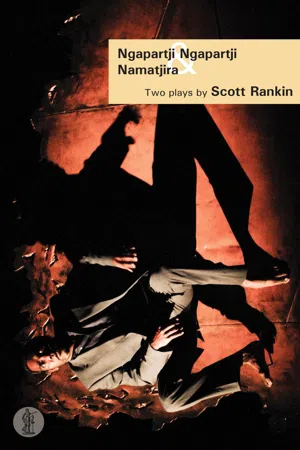
- English
- ePUB (mobile friendly)
- Available on iOS & Android
About this book
Namatjira and Ngapartji Ngapartji go right to the heart of the intersection between Indigenous and non-Indigenous experience. These stories of family, friendship, land, myth, life and death are contextualised within the social and political framework of their times. They resonate universally, yet at the same time capture unique moments in Australian history and experience.Namatjira tells the moving story of Albert Namatjira (1902–1959). Namatjira was Australia's most famous Indigenous watercolour artist and the first to achieve commercial success, but his story is hardly known. Albert Namatjira's story resonates today as strongly as it did 50 years ago, providing a lens through which we can see the relationship between Indigenous and non-Indigenous Australians both in the past and the present.Taking its name from the Pitjantjatjara concept of exchange and reciprocity, Ngapartji Ngapartji-co-created with Trevor Jamieson-is a deeply affecting experience of Indigenous history. Exploring themes of dispossession and displacement from country, home and family, the play tells the story of a Pitjantjatjara family forcibly moved off their lands to make way for the testing of British atomic bombs at Maralinga.
Frequently asked questions
- Essential is ideal for learners and professionals who enjoy exploring a wide range of subjects. Access the Essential Library with 800,000+ trusted titles and best-sellers across business, personal growth, and the humanities. Includes unlimited reading time and Standard Read Aloud voice.
- Complete: Perfect for advanced learners and researchers needing full, unrestricted access. Unlock 1.4M+ books across hundreds of subjects, including academic and specialized titles. The Complete Plan also includes advanced features like Premium Read Aloud and Research Assistant.
Please note we cannot support devices running on iOS 13 and Android 7 or earlier. Learn more about using the app.
Information
A NOTE ABOUT THE STAGING
SCENE ONE
Table of contents
- NAMATJIRA & NGAPARTJI NGAPARTJI
- Playwright’s Biography
- Introduction
- NAMATJIRA
- FIRST PRODUCTION
- MAIN CHARACTERS
- OTHER CHARACTERS
- SETTING
- HYMNS
- ACT ONE
- ACT TWO
- NGAPARTJI NGAPARTJI
- FIRST PRODUCTION
- CAST
- CHARACTERS
- A NOTE ABOUT THE STAGING
- COPYRIGHT PAGE